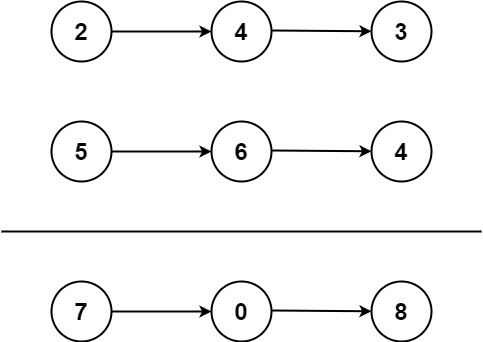2. Add Two Numbers
You are given two non-empty linked lists representing two non-negative integers. The digits are stored in reverse order, and each of their nodes contains a single digit. Add the two numbers and return the sum as a linked list.
You may assume the two numbers do not contain any leading zero, except the number 0 itself.

Constraints
- The number of nodes in each linked list is in the range [1, 100].
- 0 <= Node.val <= 9
- It is guaranteed that the list represents a number that does not have leading zeros.
Concept:
Algorithm:
- Create a dummy node and a pointer
currwhich point to the dummy node. - Create a variable
carryas a flag to know if there's a carry bit been set. - Visit l1 & l2 iterately, sum up l1 or l2 if it's not null. We need to add
carryif it present' - Update the carry flag by set
carry=sum/10every time. - Create a new node with value
tmp%10and letcurrpoint to that address. - Move pointer
currto the next bycurr = curr->next - Repeart until l1 & l2 are visited both.
- Remember to create a new node if the carry flag is set.
Complexity
Time Complexity
O(n): Where n is max(l1.length, l2.length).
Space Complexity
O(n): Where n is max(l1.length, l2.length).
Code:
/**
* Definition for singly-linked list.
* struct ListNode {
* int val;
* ListNode *next;
* ListNode() : val(0), next(nullptr) {}
* ListNode(int x) : val(x), next(nullptr) {}
* ListNode(int x, ListNode *next) : val(x), next(next) {}
* };
*/
class Solution {
public:
ListNode* addTwoNumbers(ListNode* l1, ListNode* l2) {
ListNode *p=l1, *q=l2, *dummy, *curr;
int carry=0;
dummy = new ListNode();
curr = dummy; // a pointer to the dummy node
while (p || q) {
int tmp = 0 + carry;
if (p) tmp += p->val;
if (q) tmp += q->val;
carry = tmp/10;
curr->next = new ListNode(tmp%10); // make link to the dummy
curr = curr->next; // move curr pointer to next one
if (p) p = p->next;
if (q) q = q->next;
}
if (carry) // ethier 0 or 1
curr->next = new ListNode(carry);
return dummy->next;
}
};